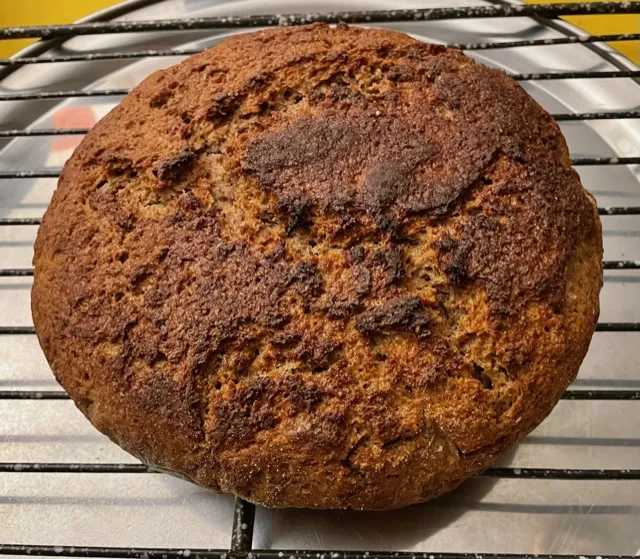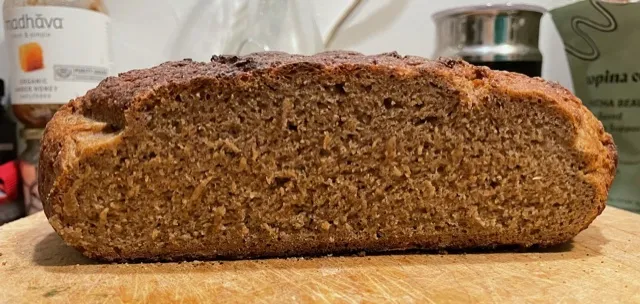As I had rye malt on hand and half a bag of light rye, I decided to try my hand at this Lithuanian palanga rye, an interesting recipe that calls for a sourdough levain, a flour and malt scald, and a yeast levain. I made it with 1/3 light rye and 2/3 whole rye.


It's a fantastic bread. The light touch of caraway (just 2 g) allows the tart seeds to tickle your mouth beneath the mellow spice of the rye. The crumb is so juicy that my partner thought I might have added beer to the batter. And the star of the show is the caramelized crust that, despite being thick, is not hard but rather crisp and shattery and melt-in-your-mouth sweet.
Two weird things: First, the light rye I used -- Mąka żytnia chlebowa typ 720 -- is insanely thirsty. The scald, though it was 130% hydration, remained astoundingly firm. And, to get all the flour to absorb into the final mix, I had to add 125g of water, upping the full dough hydration from 64% to 77%. Then, after all that, the bulk and proof were more rapid than the recipe specified -- 2 hours total instead of 3.
But I'm not complaining. I'm enjoying. This is a strikingly different rye -- deep and super-subtle at the same time. It's interesting to make and great to eat.
Rob
- squattercity's Blog
- Log in or register to post comments
Scald should be done at at least 200% hydration, and if it did not loosen it means that it probably did not convert at all.
thx, suave. that's interesting.
The scald did loosen and get kind-of airy. But it didn't go liquidy like what's shown in the pic on the rye baker site.
Did you use boiling water? You may have cooked it.
not boiling but probably too close. I guess I have to buy a thermometer if I'm gonna play with scalds. 🤣
Nice looking loaf!
To make sure you don't inactivate the malt, you can first add hot water to all the flour, and then add the malt to it and mix it in. It's pretty much guaranteed that after water is mixed with flour it'll cool down sufficiently that it will not kill the enzymes instantly.
And I agree, the hydration of the scald looks surprisingly low here...
Great idea, Ilya. Thanks. I'm definitely going to try this again, taking much more care with the scald. Who knows, I might even break down and buy a thermometer. But even if my scald failed, it's a very tasty bread.
R
Looks really nice Rob, another one for the to-bake list.
Tony
thanks, Tony. So many ryes, so little time. Enjoy!
That’s really great Rob. Interesting that the scald didn’t loosen as it should. I too wonder if the amylase didn’t fully work to release the sugars from the starch. As you know the sugars are hygroscopic so the scald should become noticeably wetter over the scald. In any event, the loaf looks great.
Benny
Thanks, Benny!
I baked a 100% light rye bread last week using the same bag of Mąka żytnia chlebowa typ 720 and had the same problem -- even at 200% hydration, the scald just didn't let go, tho I kept it at the prescribed temperature the whole time.
The only thing I can think of is that maybe the water was too hot when I first mixed the scald.
I guess I'm going to have to bake this again at some point, paying special attention to hydration, time and temp.
Twist my arm! More great bread eating!
Rob